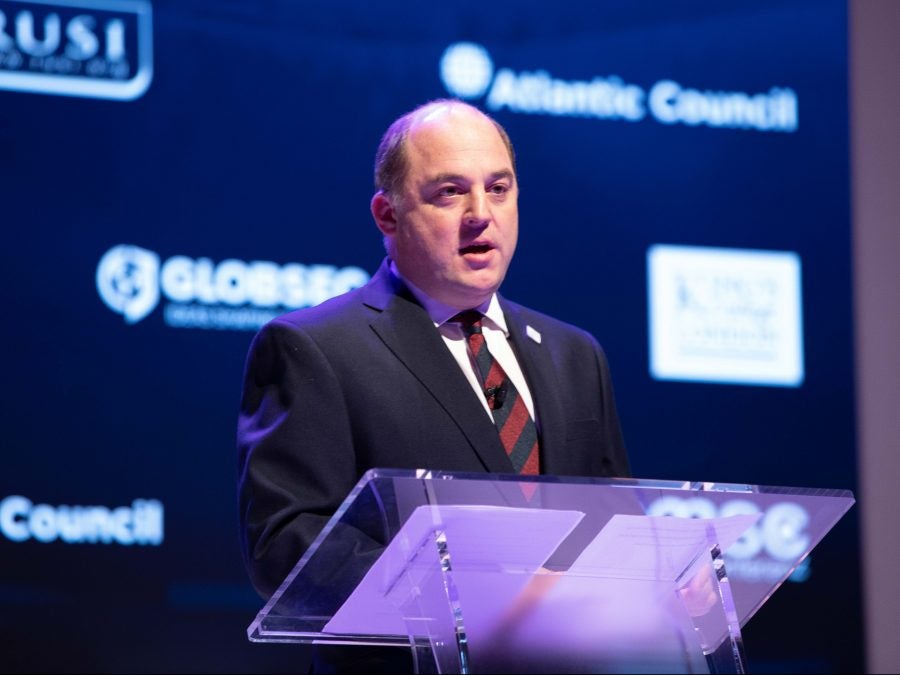
North Atlantic Treaty Organisation (NATO) leaders yesterday spoke of how the alliance is adapting to the new challenges posed by AI, hypersonic missiles, disinformation and more as they met in London.
Speaking at the NATO Engages event, UK Defence Secretary Ben Wallace and other officials discussed the changing nature of warfare ahead of a NATO leaders’ summit in Watford today.

Discover B2B Marketing That Performs
Combine business intelligence and editorial excellence to reach engaged professionals across 36 leading media platforms.
In a speech, Wallace said: “Today we face new challenges, and in keeping with our best traditions we must continue to adapt. Traditional warfare has changed. The threats are no longer only conventional. No longer only overt. Our adversaries are striking from the shadows.
“They are pursuing new tactics to divide and destabilise, exploiting new technologies to exacerbate the uncertainties of an uncertain world, and undermine our way of life.”
Wallace explained how NATO needs to innovate on both a national and an alliance-wide level, or run the risk of obsolescence as emerging technologies make defence more challenging.
He said: “NATO is now looking at the ways in which new and emerging technologies will continue to change the threat landscape, from hypersonic missiles, reducing our decision-making time in the face of an attack, to quantum computing, potentially rendering current encryption obsolete.

US Tariffs are shifting - will you react or anticipate?
Don’t let policy changes catch you off guard. Stay proactive with real-time data and expert analysis.
By GlobalData“We must understand these challenges are what we face today and we must adapt accordingly. And we must constantly be on the hunt for the next great geopolitical disruptors, such as demographic shifts or climate change, or the next technological advancement that changes the game completely.
Citing the shift in Russia’s tactics, Wallace spoke of Russian Chief of the General Staff Valery Gerasimov describing how the rules of war have changed. Wallace added that social media, cyberspace and open societies had given adversaries unparalleled opportunities to achieve political and strategic goals.
Wallace added: “The Gerasimov doctrine is here to stay. And hybrid warfare is our new reality. It is constant, and challenging to all our aims.”
These tactics, the defence secretary said, were familiar to Ukraine and Georgia, who are not NATO members but closely aligned with the alliance, and also closer to home in the UK. Wallace said: “It is happening here in Britain. Before taking up this post I was the UK’s Security Minister for over three years. I got to see into the shadows and see the daily attacks on our societies that many do not. Cyberattacks, disinformation, assassination, corruption. All prosecuted on our open and liberal societies.”
Describing how NATO has adapted to the different threats it faced in different eras, Wallace pointed out how the alliance adapted in response to the 9/11 attacks by invoking article 5, and again in 2014 with Russia’s illegal annexation of Crimea.
In response to emerging threats, Wallace said a ‘three-fold’ response is needed, pulling in investment, innovation and solidarity to maintain NATO’s strength.
He said that investment in both conventional forces and new capabilities is needed to keep NATO strong enough to maintain an effective deterrence. An important part of this, he added, would be that across Europe and Canada investment in defence is set to increase by around $400bn by 2024 as more allied countries get closer to the recommended defence spending of 2% of GDP.
He also said the UK was the first allied country to offer offensive cyber capabilities to NATO.
Wallace said that at today’s leaders’ summit in Watford, NATO would agree on a plan for the alliance to adapt to the threat of emerging technologies and the proliferation of cyber and space as warfighting domains.
Wallace told the audience: “I am pleased to say that when our leaders meet tomorrow, they will recognise the progress that NATO has made in adapting to these new challenges – agreeing a plan for NATO’s response to emerging and disruptive technologies; recognising two new operational domains in space and cyberspace; and developing plans to confront and deter hybrid tactics of the kind I have been speaking about.”
Steering clear of the public spats between world leaders about the priorities of NATO, Wallace closed his speech saying that ultimately NATO’s power is drawn from its ability to issue a collective response.
He said: “We must stand together, no side deals, no separate voices. Our adversaries strive for that division, they fund that division, and target that division. We will not let them succeed.”





